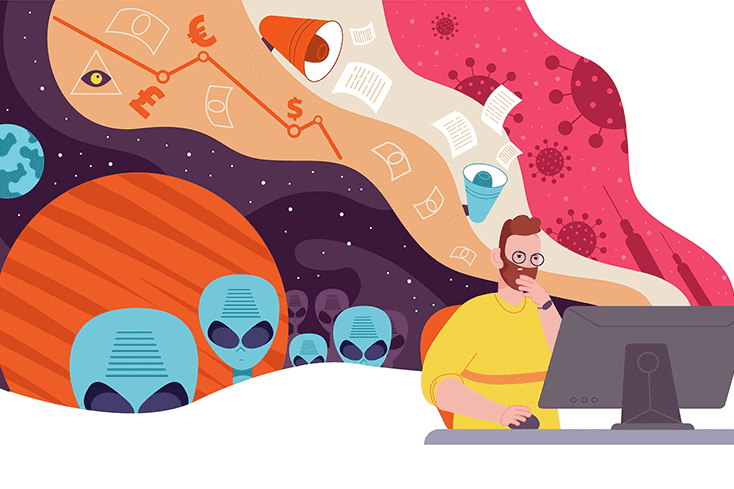August 30, 2022
By Jason Jepson

A psychiatrist once told me that I understood my illness better than many of her patients. I took that as a compliment because I have worked hard to understand my schizoaffective disorder diagnosis and to recognize my symptoms. For example, I am now able to take a step back when I start to believe something strongly (like someone being in love with me), reflect and determine what is happening. Then, I can decide if the belief is a delusion or not. Learning to identify my delusions has been a process, but I have found a method that works for me — and I hope to share what I have learned.
I keep a chart on my refrigerator of schizophrenia symptoms that I experience. This helps guide me through my feelings and beliefs, and it offers me an explanation for my emotions and actions. If I find myself believing I am an important public figure or existing in a fantasy world, I can refer to my chart to evaluate the situation. In this case, the chart tells me that this belief is a grandiose delusion (and a common one, as I’ve learned from talking to other people diagnosed with schizophrenia).
If I notice that the voices in my head are distracting — causing me to forget where I’ve put things or forget what I want to say in a conversation — I can look to the chart to remember that forgetful behavior is a symptom.
I also have a chart listing the symptoms of exaggerated thinking. I usually look at this list for comfort after having a traumatic delusion, like believing I am being stalked, hunted, framed or tricked. I've learned this is another one of the common manifestations of schizoaffective disorder, called persecutory delusions. I feel a little less alone when I look at the chart on my refrigerator. I even feel like my illness is “textbook schizophrenia” — a reminder that others experience this, too.
Attending group therapy, where I can listen to others describe their delusions and verbalize my own delusions, has helped me to identify my delusions. While knowing medical terminology can be important, we learn the most from each other by describing our experience with a goal of understanding the unreality of a delusion.
Determining as a group that delusions are not actually happening — rather, they are symptoms of schizophrenia — is a huge step in accepting our diagnosis. Group therapy has also given me tools for evaluating my symptoms when I am alone. If I hear a voice outside the door, I now know to open the front door to prove to myself that no one is there and that the voice is a delusion.
Leaning on the supportive people in my life has been critical in understanding and managing delusions. My mom helps me with certain tasks, like editing my writing, when my disorganized thoughts and difficulty concentrating keep me from remembering grammar rules and syntax. She also helps me to clarify my thoughts and dig deeper to understand how a delusion makes me feel at the time I am experiencing it. Accepting that I needed this kind of help has been an important step for both my writing career and my personal growth. For those of us who have a severe mental illness diagnosis, there is no shame in asking for the help or accommodations we need.
Medication has been critical to managing my symptoms. Being on the appropriate regimen makes it possible for me to recognize a symptom before I act on it. Often, my perceptions can be distorted by the schizophrenia, and I believe certain circumstances require action from me, when, in reality, they do not. For example, If I don’t receive mail for three days straight, I might be tempted to contact my mailman to see why I am not getting mail. Fortunately, medication has helped me identify these thoughts before making decisions.
Moving forward, I hope to continue living a productive life in which my symptoms can’t control me. Researching and putting into practice what I learn about my diagnosis allows me to step out of myself and look inward to better explain myself to my doctor, family and friends. Being able to articulate my experience can be a relief.
I will always have a deep desire to understand as much as possible about my diagnosis of schizophrenia. Knowledge gives me power over my symptoms. With information, I can be a vital contributor on my support team.
Jason Jepson grew up in Virginia, but he now lives in Myrtle Beach, South Carolina, where he advocates for those who have received a diagnosis of severe mental illness. Jason was diagnosed with schizoaffective disorder while he was enlisted in the U.S. Army. He began his mental health advocacy with NAMI, where he received peer-to-peer certification, and he has since gone on to volunteer helping veterans who have mental health issues. Jason has written two books, and his first-person account of day-to-day life with schizophrenia has appeared in “Schizophrenia Bulletin,” an academic journal published by Oxford Press.
We’re always accepting submissions to the NAMI Blog! We feature the latest research, stories of recovery, ways to end stigma and strategies for living well with mental illness. Most importantly: We feature your voices.
LEARN MORENAMI HelpLine is available M-F, 10 a.m. – 10 p.m. ET. Call 800-950-6264,
text “NAMI” to 62640, or email. In a crisis, call or text 988 (24/7).